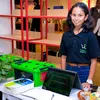Meet 6 women entrepreneurs offering eco-friendly solutions for a greener world
If you are looking for eco-friendly solutions, look no further than the alternative ones offered by these women entrepreneurs in India.
The time has come for people to pay heed to the unprecedented climate change happening on this earth. Its effects are felt on ground; countries across the world are experiencing extreme events - floods, earthquakes, heavy snowfall in the winter and harsher summers.
In 2018-19, India lost as many as 2,400 lives to such extreme weather conditions that are increasing in both frequency and intensity, according to the Indian Meteorological Department.
The United Nations Development Programme (UNDP) stated that climate change is no longer an environmental but a developmental problem. While we cannot turn back the clock, change can be made at individual levels by changing our habits and switching from environmentally harmful products to eco-friendly solutions.

Here are six women who have developed eco-friendly alternatives to ensure the home décor products you purchase, family vacations you take, and essential hygiene products you use do not come at a heavy cost for mother nature.
Prerna Prasad, Ecoplore
Prerna Prasad, a journalist and activist fighting corruption, turned to social entrepreneurship when she realised that protecting the environment was the need of the hour. After quitting her job in 2016, she decided to start ecotourism startup Ecoplore.
To identify eco-friendly accommodation, Prerna and her team started to visit and verify hotels, resorts, homestays, and property chains to ensure they meet two criteria. Each property must contain 30 percent of greenery and the construction should be non-concrete and can be made of mud, wood, stone, bamboo or any local architecture.
In 2018, it started operations partially, opening doors to friends and family. In the same year, Prerna received a grant of Rs 50,000 as a fellow of Women Entrepreneurship and Empowerment (WEE), a joint initiative of IIT-Delhi, government think tank Niti Aayog, and the Department of Science and Technology under the government of India.
At present, the Ghaziabad-based startup offers 120 different eco-friendly stay options and has served more than 300 clients within six months.
Ashwini Gaikar, Sunshine Elements
When Ashwini Gaikar was pregnant with her daughter, she went to live in the wilderness in Calmshet, a hamlet in Lonavala, Maharashtra.
After quitting her nine-to-five job in mass media marketing, Ashwini decided to explore organic and natural ingredients to produce handmade soaps and eventually launched Sunshine Elements in 2018. This is also because she experienced skin pigmentation and rashes because of harsh soaps during pregnancy.
The idea was to create luxury, hand-crafted products that include a limited edition range of artisanal soaps, body butter, body scrubs, and aromatherapy candles.
These products do not contain any artificial blends or fragrance oils and are wrapped in eco-friendly packaging. The soaps are priced between Rs 200 and Rs 350, while 100 to 150 gm bar butter and scrubs cost between Rs 400 and Rs 800.
In the next three years, the entrepreneur plans to add 15 to 20 more products to the range.
Nupur Agarwal, Evolve Foundation and Kisan Window
After realising that most of India’s natural and human resources lie in rural areas, serial social entrepreneur, Nupur Agarwal founded Evolve Foundation in 2016 to create smart sustainable villages.
The Foundation adopted Tauli Bhud village in Dehradun, home to the Jaunsari tribe, believed to be the descendants of the pandavas but had turned into a ghost village as most of the younger population had migrated to cities.
The village is today thriving economically and culturally, thanks to various initiatives of the Foundation. This includes starting a cottage industry to produce eco-friendly plantable stationery products like pencil, paper, and notepads.
The products have found many notable clients including Oil and Natural Gas Corporation (ONGC), the Election Commission of India, Uttar Pradesh government, Federation of Indian Chamber of Commerce, PricewaterhouseCoopers, and startups like Clovia and Flipkart, among others.
Last year, the entrepreneur led a week-long project called Kahaani that brought together 200 artists from across the world to the village to paint stories and folk tales on the walls of the village.
To promote the concept of fair trade without middlemen, Nupur founded Kisan Window which has flourished into a network of more than 8,000 farmers across India selling organic products.
Nupur is also a mentor to the Atal Innovation Mission, the government of India’s flagship initiative to promote a culture of innovation and entrepreneurship and a changemaker at Global Action on Poverty.
Aparna Vinod, Igloopupa
Aparna Vinod is a self-proclaimed nature lover and has been engaged in promoting eco-conscious living since 2010. She has organised several exhibitions selling handmade and recycled products across Kerala.
In 2019, she founded her second venture , an online eco-friendly accommodation booking platform. The platform features 56 environmentally conscious properties like homestays, farm stays, tree houses, tented stays, and campsites.
The properties are assessed on its sustainability practice with regard to water and waste management, as well as community engagement in terms of employment, measured through its proprietary Sustainability Index Metric (SIM). At the same time, the platform does not accommodate more than 20 travellers at a time in order to avoid over-tourism.
Aditi Balbir, V Resorts
As a travel enthusiast, Aditi Balbir has travelled to more than 50 countries. After a decade-long career in finance in companies like McKinsey and Baring Equity, she became an entrepreneur with V Resorts, a management company for homestays and small boutique places that lacked professional management.
Gradually, ecotourism as a business model emerged out of the need to ensure longevity. This includes tying up with local entrepreneurs to organise activities and adopting ecologically-friendly methods for cleaning, waste management, and energy use.
With 170 properties, V Resorts is empowering local communities in 20 Indian states by employing local staff, which makes up for 90 percent of its employees, and ensuring 100 percent local procurement.
Pratima Sinha and Somya Suresh, Nurture India
Childhood friends-turned-co-founders Pratima Sinha and Somya Suresh observed that though eco-friendly solutions had become a popular choice, there were few eco-conscious homeware brands available for consumers.
The duo took a sabbatical from their jobs and started researching on traditional Indian handicrafts and visited craft clusters in West Bengal and Karnataka. In 2018, they launched their collection at an exhibition in greater Noida and landed their first big client, the Adani Group, and bagged their first international order in the UK.
Today, the startup supplies to big clients like Taj Hotels, The Bombay Store, and Hamilton Housewares, and Chumbak while also exporting internationally to the US, the UAE, Spain, the UK, and Canada.
Primarily known as a B2B brand, they are now looking at expansion by retailing on various ecommerce marketplaces.
Edited by Rekha Balakrishnan










